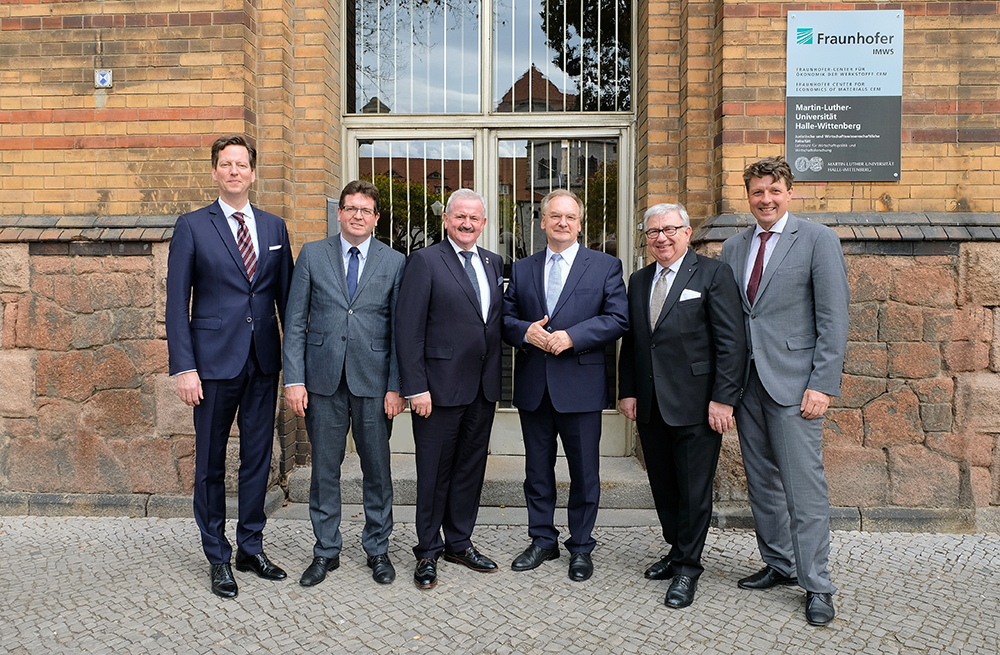Saxony-Anhalt’s Minister President Haseloff and Fraunhofer President Neugebauer visit the Center for Economics of Materials CEM
Globalization, digitization, decarbonization – the industry’s framework conditions are constantly changing, and at an increasing speed. The Center for Economics of Materials CEM provides technologically oriented material-economics analyses to assist with this. During a visit to the CEM in Halle (Saale), Dr. Reiner Haseloff, Minister President of the State of Saxony-Anhalt; Prof. Dr. Reimund Neugebauer, President of the Fraunhofer Society; Prof. Dr. Dieter Spath, President of acatech – Deutsche Akademie der Technikwissenschaften; and Prof. Dr. Christian Tietje, Rector of Martin Luther University of Halle-Wittenberg, learned how innovative and sustainable materials and technologies can help contribute to a successful structural change.

The Center for Economics of Materials CEM was founded in August 2017 as a joint institution of the Fraunhofer Institute for Microstructure of Materials and Systems IMWS and Martin Luther University of Halle-Wittenberg (MLU). The experts from Halle advise the fields of business and politics on issues relating to efficient raw-material and material use as well as running an innovative, sustainable business.
A current focus of their research work is closed-loop carbon circulation as the basis for a sustainable industry and for the associated structural change. Fossil carbon is used to produce fertilizers, medications, plastics and much more. However, its natural occurrence is limited, and the industry is highly dependent on third countries. Using new technologies and innovations, the Fraunhofer researchers hope to help reduce this dependency and bring about an industrial structural change. Its success will be guaranteed using innovative technologies and holistic economic integration. “When established industries are rebuilt within a region, it doesn’t happen overnight. Such developments should and can be supported; the economic and social effects must be lessened, and new perspectives must be created. Innovations are the key to this,” says PD Dr. Christian Growitsch, Head of the Fraunhofer CEM. “We are helping industrial and political actors create a transformation path for these developments that suits companies’ needs, the market developments and the specific local framework conditions as closely as possible.”
The CEM projects include, for instance, securing the carbon supply for a sustainable chemical industry and developing economic systems for a sustainable material recycling system. In addition, the CEM coordinates the activities of the Fraunhofer Chemical and Biosystems Engineering Center, which is hoping to lay the groundwork for a sustainable chemical industry based on renewable resources and digitized value creation systems. The main focuses of the MLU, on whose behalf Prof. Dr. Ulrich Blum is leading the CEM, include critical raw materials and global value chains.
“Our research not only needs to be closely technologically oriented toward the needs of the industry, but must also keep in mind the economic aspects that are relevant for companies,” explains Fraunhofer President Prof. Reimund Neugebauer. “We want to create the basis for new, economical and ecologically sustainable business models while also meeting our social responsibilities. That will allow us to keep providing important stimuli for the transformation to a sustainable industrial society.”
Dr. Reiner Haseloff, Minister President of the State of Saxony-Anhalt, emphasized the need for scientifically oriented advice in politics. “How do disruptive innovations affect the business models for industries in our state? What happens to jobs in a region when strategically relevant raw materials grow scarce or become less significant for climate-policy reasons? How can we predict which structural policy measures or infrastructure investments will be successful? The answers to these questions are an important basis for making carefully considered political decisions.” Especially for an urgent issue like structural change, he said, it is helpful to rely on scientific expertise and not just to stimulate research and development, but also to consider value chains and business models. “The CEM has quickly established itself as a valuable partner for us. The work done by the researchers in Halle is a real locational advantage for our state,” says Haseloff.
During his visit to the CEM, Prof. Dr. Christian Tietje, the Rector of MLU, emphasized the successful collaboration between the university and Fraunhofer. “If we combine our strengths, we can achieve excellent scientific results even faster and more effectively – which also benefits people in the region. During the first year of its operation, the CEM has already given us many examples of how well this relationship can work.”
Here you can watch the image film "Germany's Next Generation Energy Hubs", in which the Fraunhofer IMWS was involved.